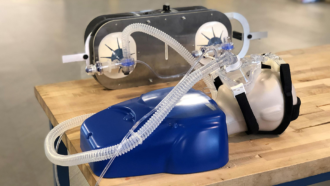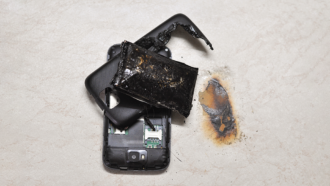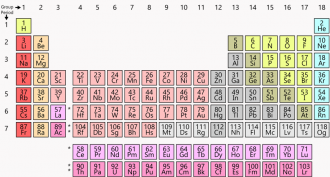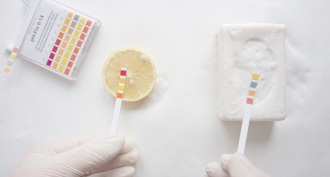MS-PS1-2
Analyze and interpret data on the properties of substances before and after the substances interact to determine if a chemical reaction has occurred.
-
 Tech
TechCOVID-19 victims could breathe easier with these innovations
Feared equipment shortages due to the COVID-19 pandemic have prompted research teams to develop novel technologies to help oxygen-starved lungs.
-
 Chemistry
ChemistryBatteries should not burst into flames
Because lithium-ion batteries power modern life, they need to store a lot of energy. Now scientists are focusing on making them safer.
-
 Chemistry
ChemistryConverting trash to valuable graphene in a flash
Flash heating of carbon-rich wastes creates graphene, which has many commercial uses.
-
 Chemistry
ChemistryExplainer: What the pH scale tells us
The pH scale tells us how basic or acidic something is. Pure water sits in the middle of the scale, at a pH of seven.
By Lida Tunesi -
 Earth
EarthStudy appears to rule out volcanic burps as causing dino die-offs
New data on when massive volcanic eruptions happened do not match when the dinosaur mass extinction took place.
-
 Materials Science
Materials ScienceSelf-powered surface may evaluate table-tennis play
Scientists at the Georgia Institute of Technology built a 'smart' surface on which to play table tennis. It can track the location, speed and direction of the ball.
-
 Materials Science
Materials ScienceThe future of crystal-based solar energy just got brighter
Researchers have upped the efficiency of layered solar cells that could be printed or painted onto surfaces. Now they are working to make them more rugged.
-
 Chemistry
ChemistryChemistry’s ever-useful periodic table celebrates a big birthday
2019 is the International Year of the Periodic Table. But the traditional chart is just one of many shapes that chemists and other scientists have developed to organize the elements.
By Sarah Webb -
 Chemistry
ChemistryExplainer: What are acids and bases?
These chemistry terms tell us if a molecule is more likely to give up a proton or pick up a new one.
By Lida Tunesi -
 Earth
EarthExplainer: Understanding geologic time
Geologic time is unimaginably long. Geologists puzzle it out using a calendar called the Geologic Time Scale.
By Beth Geiger -
 Earth
EarthExplainer: How is water cleaned up for drinking
Unless you’re drinking well water, city folks typically get drinking water that has been treated in a water-treatment plant. Here’s what that means.
-
 Health & Medicine
Health & MedicineDrug-detection system could help partygoers protect themselves
Fed up with people getting unwittingly drugged at parties, a teen designed a special bracelet. It can alert drinkers to the presence of certain hidden drugs.